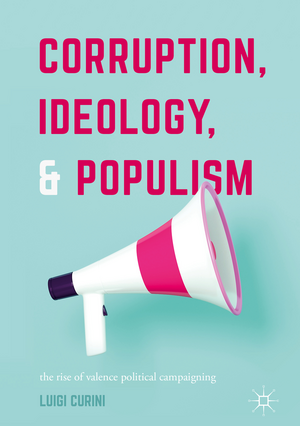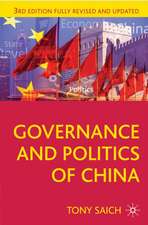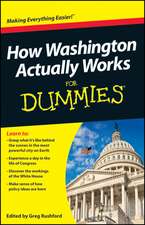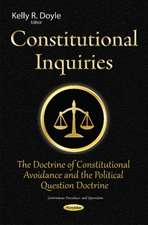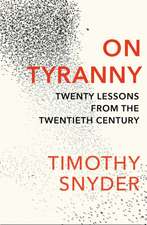Corruption, Ideology, and Populism: The Rise of Valence Political Campaigning
Autor Luigi Curinien Limba Engleză Hardback – aug 2017
| Toate formatele și edițiile | Preț | Express |
|---|---|---|
| Paperback (1) | 716.50 lei 6-8 săpt. | |
| Springer International Publishing – 22 aug 2018 | 716.50 lei 6-8 săpt. | |
| Hardback (1) | 721.50 lei 6-8 săpt. | |
| Springer International Publishing – aug 2017 | 721.50 lei 6-8 săpt. |
Preț: 721.50 lei
Preț vechi: 879.88 lei
-18% Nou
Puncte Express: 1082
Preț estimativ în valută:
138.14€ • 141.71$ • 116.31£
138.14€ • 141.71$ • 116.31£
Carte tipărită la comandă
Livrare economică 26 februarie-12 martie
Preluare comenzi: 021 569.72.76
Specificații
ISBN-13: 9783319567341
ISBN-10: 3319567349
Pagini: 178
Ilustrații: XVII, 206 p. 30 illus.
Dimensiuni: 148 x 210 x 18 mm
Greutate: 0.42 kg
Ediția:1st ed. 2018
Editura: Springer International Publishing
Colecția Palgrave Macmillan
Locul publicării:Cham, Switzerland
ISBN-10: 3319567349
Pagini: 178
Ilustrații: XVII, 206 p. 30 illus.
Dimensiuni: 148 x 210 x 18 mm
Greutate: 0.42 kg
Ediția:1st ed. 2018
Editura: Springer International Publishing
Colecția Palgrave Macmillan
Locul publicării:Cham, Switzerland
Cuprins
Chapter 1. Political corruption and valence issues.- Chapter 2. The ideological incentive for campaigning on corruption issues.- Chapter 3. Political corruption in legislative speeches: the Italian way (1946-2014).- Chapter 4. Political corruption in electoral programmes: a comparative perspective.- Chapter 5. Political corruption on Twitter: the 2014 European Electoral campaigning.- Chapter 6. Conclusion: which implications?.
Notă biografică
Luigi Curini is Associate Professor at the University of Milan, Italy, and Visiting Professor at Waseda University of Tokyo, Japan. He was selected for the 2016 International Visitor Leadership Program by the U.S. Department of State's Bureau of Educational and Cultural Affairs. His recent publications include Politics and Big Data: Nowcasting and Forecasting Elections with Social Media (with A. Ceron and SM. Iacus, 2017) and Why Policy Representation Matters: The Consequences of Ideological Congruence between Citizens and their Governments (with W. Jou and V. Memoli, 2015).
Textul de pe ultima copertă
This book investigates the ideological conditions inducing political actors to highlight corruption issues through valence campaigns. Using case studies and comparative analyses of party programmes, legislatives speeches and social media data, the author demonstrates that the more parties and/or candidates present a similar policy programme, the more they rely on valence campaigns. In other words, as the ideologies of parties have become increasingly similar over recent decades, the content of political competition has substantially shifted from policy to non-policy factors, such as corruption issues. These dynamics, and the ideological considerations underpinning them, also provide a novel perspective on recent phenomena in contemporary democracies, such as the growth of negative campaigning, as well as populist strategies based on anti-elite rhetoric. The book will appeal to students and scholars interested in political corruption, valence politics, and electoral campaigning.
<
<
Caracteristici
Bridges two extensive branches of literature, political corruption and valence issues, rarely engaging with each other Combines empirically-grounded single-country studies with a comparative analysis of both national and European elections Illustrates the importance of differentiating the direction of valence campaigning on corruption issues Highlights the relationship between valence issues, populist strategies based on anti-elite rhetoric and ideological considerations
